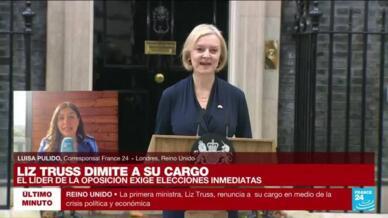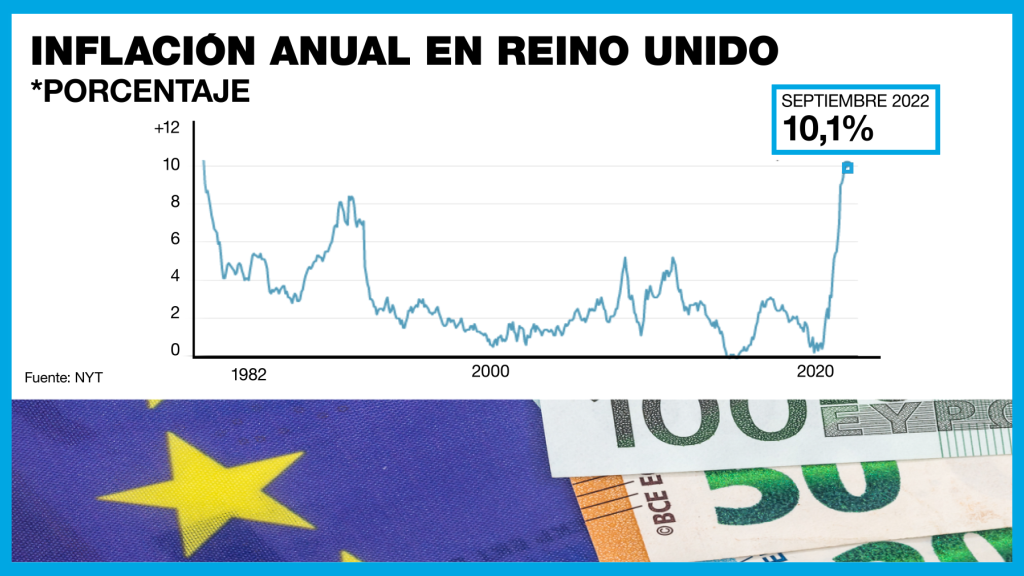A month and a half after being confirmed as British Prime Minister, Lizz Truss announced on October 20 that she will leave office. Truss was cornered after weeks of political turmoil over her failed tax plan, which caused chaos and nervousness in the markets against a backdrop that was not favorable for the UK. Labor leader Keir Starmer called for a general election.
The United Kingdom relives the resignation of a prime minister in just three months.
Lizz Truss, confirmed last September as leader of the Government to replace Boris Johnson, announced on October 20 that she will step down from office.
Outside Downing Street, the leader of the ruling Conservative Party made the announcement, which follows the almost complete evaporation of her political authority, after her now overturned fiscal plan caused markets to crash, the departure of two key ministers from her cabinet and it will lead her to lose the confidence of almost all the parliamentarians of her own movement.
“I cannot fulfill the mandate for which I was elected by the Conservative Party,” said the still leader of the Government.
Truss, who resigns 45 days after taking office and becomes the shortest-serving prime minister in UK history, will remain in office until a successor is chosen.
“This will ensure that we stay on track to meet our fiscal plans and maintain economic stability and national security in our country,” Truss said, adding that he spoke with King Charles III to notify him of his resignation.

The premier also met with 1922 Committee Chairman Graham Brady to “agree that there will be a leadership election to be completed within the next week,” Truss confirmed.
The prime minister’s resignation occurs just one day after she assured Parliament that she would not resign, noting that she is “a fighter” and not “a deserter.”
But finally Truss was cornered and decided to step aside. The influential 1922 Committee, which oversees the election to the leadership of the British Conservative Party, met in the morning hours of this October 20 to assess the crisis in the Executive.
According to the British newspaper ‘The Times’, the chairman of that committee, Graham Brady, would have received more than the 54 necessary letters from “Tory” parliamentarians to call a vote of no confidence against Truss.
Some deputies of the formation already pointed out that the head of the Administration had the days numbered in power.
Labor and Liberal Democrats call for immediate general election
The leader of the Labor Party, Keir Starmer, demanded early general elections immediately after learning of the resignation of the British leader.
According to the country’s legislation, the vote for a new government leader must be called within the ruling political party, as was the case for appointing Johnson’s successor.
However, the opposition is calling for general elections, with the possibility that the leadership will fall to another party.
“After 12 years of Conservative failure, the British people deserve much better than this revolving door of chaos. In recent years, Tories have set record taxes, wrecked our institutions, and created a cost-of-living crisis. Now they have crashed the economy so badly that people are facing an extra £500 a month on their mortgages. The damage they have done will take years to fix,” the legislator said in a written statement.
After 12 years of Tory failure, the British people deserve so much better than this revolving door of chaos.
We need a general election, now.
My full statement: pic.twitter.com/NAQz70eVke
— Keir Starmer (@Keir_Starmer) October 20, 2022
The Labor MP blamed the Conservatives who have formed a government on numerous occasions for generating a crisis that leaves the country “weaker” and that has been paid for by the British people.
Citizens “must have the opportunity to compare the Tories’ chaos with Labor’s plans to clean up their mess, grow the economy for workers and rebuild the country for a fairer, greener future. We must have the opportunity for a new beginning. We need general elections, now”, he insisted.
The leader of the Liberal Democrats party, Ed Davey, also called for a general election as soon as possible.
The appointment of a new British prime minister is expected before October 31
To the calls for immediate elections of the Labor Party, the declarations of the conservative deputy Graham Brady, responsible for organizing internal motions of censure, are added, who exposed the possible date for the country to know who will be its new prime minister.
Brady assured that it will be possible to hold a vote to elect the new leader of the ‘tories’ and therefore the new British prime minister, before October 28.
“I spoke with the president of the party, Jake Berry, and he confirmed that it will be possible to hold a vote and conclude a leadership election by Friday, October 28,” the parliamentarian assured the local press.
The date is key, Brady recalled, since legislators seek to have a new government leader before the medium-term fiscal plan is established, for which October 31 has been established as the limit.
‘The Times’ reported that former Prime Minister Boris Johnson, whom Truss succeeded after the ethics scandal known as ‘partygate’, would participate in the race in an attempt to return to office.
“He’s doing polls, but he says he thinks it’s a matter of national interest,” said Steven Swinford, political editor of The Times.
The tax proposal that led to Truss’s resignation
The United Kingdom has experienced weeks of political and economic turmoil, after the Prime Minister presented a package of tax cuts on September 23, which in her opinion would help promote economic growth.
However, measures including £45bn of tax cuts and a cut from 45% to 40% of income tax for large fortunes, triggered market turmoil, hit the value of the pound sterling and increased the cost of British Government borrowing.
Faced with chaos, the Bank of England was forced to intervene to prevent the crisis from spreading to the broader economy and putting pension funds at risk.

Within days, Truss was forced to withdraw the offer to lower the aforementioned levies. And last October 14, under intense political and economic pressure, she fired her finance minister and ally on her proposal, Kwasi Kwarteng.
The situation has generated further questions against Truss, after his new finance minister, Jeremy Hunt, completely dismantled the controversial plan to stabilize the markets.
Hunt scrapped nearly all of Truss’s tax cuts, along with his signature energy policy, an initiative aimed at limiting rising energy bills and promoting other sources.
The new head of the portfolio also excluded the premier’s promise not to cut public spending. He said the government will need to save billions of pounds and that “many tough decisions” need to be made before it sets the medium-term fiscal plan.
Truss assumed the mandate of the Government in the framework of a complex economic context for his country, after Brexit, the high costs of energy in the midst of the Russian war in Ukraine and inflation.
The cost of living in the nation increased 10.1% in September, returning to the maximum in 40 years that was marked last July, a situation that hits the pockets of British families.
With Reuters and local media







![[Img #74664]](https://thelatestnews.world/wp-content/uploads/2024/12/James-Watson-The-controversial-genius-behind-the-double-helix-150x150.jpg)




